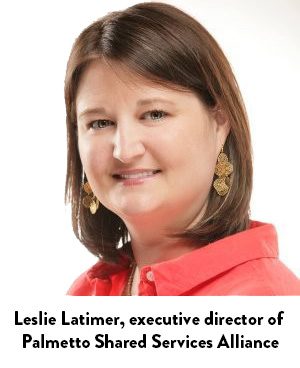All Blog Posts
How Palmetto Shared Services Alliance is Adapting to Meet Community Need in the Era of COVID-19
The Riley Institute’s Planning and Evaluation Capacity Building Initiative (PECBI) empowers nonprofit organizations to foster a culture of organizational learning around data and evaluation. As community needs grow due to the pandemic, we’re asking our PECBI partners what they’ve learned as they’ve adapted their services in this challenging time.
In the third installment of our Q&A series, Impact in the Era of COVID-19, we speak with Leslie Latimer, Executive Director of Palmetto Shared Services Alliance (PSSA).
Published September 8, 2020
This interview has been edited for clarity and brevity.
See all Impact in the Era of COVID-19 interviews
 For those who don’t know, tell us a bit about what Palmetto Shared Services Alliance does and who it serves.
For those who don’t know, tell us a bit about what Palmetto Shared Services Alliance does and who it serves.
Palmetto Shared Services Alliance exists to improve the quality of South Carolina Early Care and Education (ECE) professionals and environments through a system of online and on-site supports. These supports are designed to save time and money, giving providers the ability to reinvest in quality improvements for their center and the children and families they serve.
Currently, most ECE providers and organizations operate as small businesses and are typically minority-owned and women-operated. Those who come to this field enter it to fulfill a worthy and vital mission, yet most lack business skills and training.
Our Shared Services model and web platforms grant childcare providers in South Carolina access to national, expert-vetted management and operational resources, a dedicated ECE job board, professional development, and reduced costs through shared buying power. While PSSA offers connections to discounts with national vendors, we also provide access to local and statewide vendors to help ECE providers save time and money while simultaneously giving back to the community on a local level.
Currently, our network consists if 129 providers in Greenville County and 299 statewide.
What community needs has PSSA identified as a result of COVID-19, and have they changed over the course of the pandemic?
ECE providers have been facing a number of challenges due to COVID-19. Many childcare centers were unable to find the supplies and materials they needed to run their business — not necessarily PPE, but gloves, cleaning supplies like Clorox (bleach water is required daily for sanitization), thermometers, and even food.
Staffing also was, and continues to be, a major issue, because the childcare sector employs a large percentage of compromised workers over the age of 65 and single moms who are having to care for their own children due to public schools being closed or operating virtually. In addition, in many cases, there is no medical coverage for ECE providers.
The struggles of ECE providers also have had profound effects on the community. We saw a shortage of childcare centers open for essential workers during the initial quarantine period. After that period was over, it was hard for essential and non-essential workers to go back to work because centers remained closed due to supply and staff shortages and financial burdens that weren’t allowing them to open.
Are you undertaking any new initiatives to meet the community’s needs during the pandemic?
Yes, PSSA has undertaken a number of initiatives to support ECE providers during this time. We are working with statewide vendors to secure access to food, cleaning supplies, and PPE for providers in our network. To help with staffing issues, we opened our dedicated ECE job board to all childcare centers in the state, even non-members.
To make professional development opportunities more accessible, we transitioned our in-person classes to a webinar format, and we have been offering free COVID training and virtual networking sessions for ECE center directors. These sessions have allowed directors to connect around the shared difficulties and solutions they developing in the face of COVID.
Finally, many directors and stakeholders have reached out to PSSA for guidance and resources as they navigate through this time. We have provided crisis management, leveraging PSSA’s resources and expertise to help directors find staff, supplies, vendor discounts, and more.
Are there any changes that you’ve made to your programs that you might consider integrating in the long-term, even once COVID-19 is behind us?
The virtual networking sessions for ECE center directors have been such a hit, so we are making them a regular offering. Directors who have attended told us these sessions allow them to come together, feel less isolated, discover what others are doing to combat the spread of COVID in their centers, and quite simply, band together as allies in advocating for their staff, children, and families.
We also are considering extending the use of webinars for professional development. This option has allowed us to meet providers where they are, so we may make this a long-term practice.
While we miss face-to-face interaction, technology has given PSSA staff greater freedom and flexibility around scheduling, allowing for more opportunities to meet with and train providers.
What’s been your biggest takeaway from this moment we’re in?
COVID-19 has shined a light on early care and education, allowing communities to see the importance of the services the sector offers and the foundational role ECE plays in supporting our workforce. In addition, the South Carolina ECE community has realized that PSSA is a great resource for childcare providers.